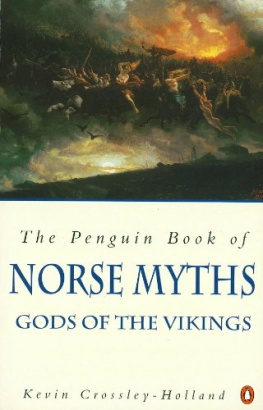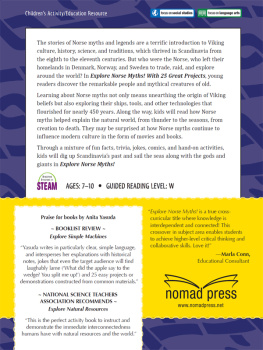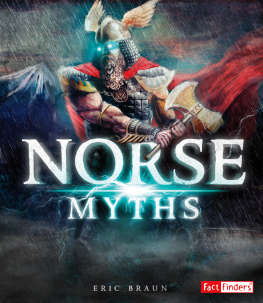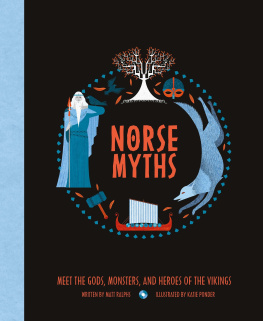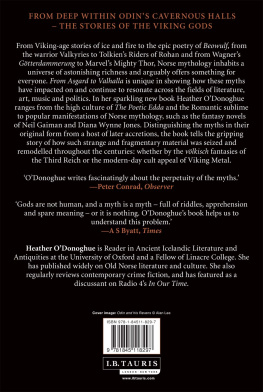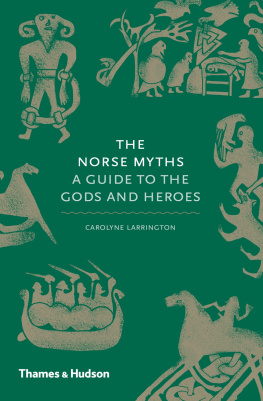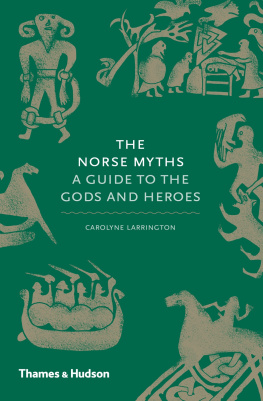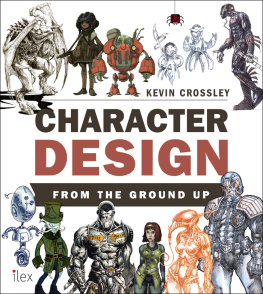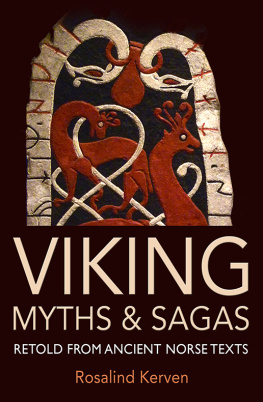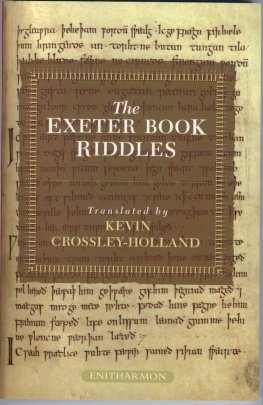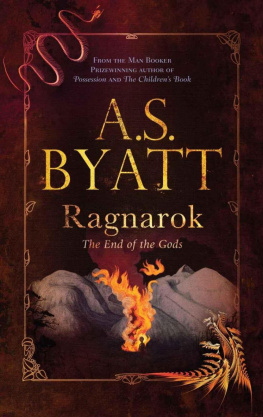PENGUIN BOOKS
THE PENGUIN BOOK OF NORSE MYTHS
Kevin Crossley-Holland was educated at Bryanston School and St Edmund Hall, Oxford. He was Gregory Fellow in Poetry at the University of Leeds from 1969 to 1971, editorial director of Victor Gollancz (19727) and Lecturer in Anglo-Saxon Literature and Culture for the Tufts University London program, from its inception in 1967 until 1978. He has recently returned from Minnesota, where he was Fulbright Visiting Scholar at St Olaf College (1990) and Endowed Chair in the Humanities and Fine Arts at the University of St Thomas (19915).
His translations of Old English poetry are brought together in The Anglo-Saxon World (1982), and he has also translated The Exeter Book Riddles for Penguin Classics (revised edition, 1993). His publications include six volumes of poetry, the most recent being The Language of Yes (1996), and two anthologies: The Oxford Book of Travel Verse (1986) and Folk Tales of the British Isles (1986). His books for children include Beowulf (1982), British Folk Tales (1987) and Storm, which was awarded the Carnegie Medal for 1985. Crossley-Holland has collaborated with a number of composers, including Sir Arthur Bliss, William Mathias and Nicola LeFanu, with whom he has written two operas, The Green Children and The Wildman.
Kevin Crossley-Holland has two adult sons and two young daughters, and he lives in Norfolk.
Acknowledgments
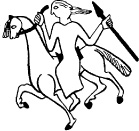
W HAT WE WRITE is partly chosen for us, partly of our own choosing; and however rapidly it may be committed to paper, a book may be a very long time in the making. My interest in myth, legend and folktale was first whetted by the stream of stories that I heard, night after night, from my parents, and then by the way in which they encouraged an awareness of religious beliefs past and present. I began to be specifically interested in Germanic tradition after my father played and recorded the first reconstruction of the Sutton Hoo harp, and after inheriting an Anglo-Saxon burial urn from my grandfather. Later, at Oxford, I started to translate Old English poetry and in this was given great encouragement and assistance by my tutor at St Edmund Hall, and later my collaborator, Bruce Mitchell. Anglo-Saxon studies lead naturally to a curiosity about the whole jigsaw of contemporary North West European culture, and the invitation of Phyllis Hunt at Faber and Faber to edit The Faber Book of Northern Legends stimulated me to read all the more widely in the three great bodies of early Germanic literature Norse myths, Icelandic sagas and Germanic heroic poems. These seem to be the stepping stones that led to the writing of this book and, in making acknowledgments, it seems right to begin by offering my thanks to the people associated with them.
During the last three years I have received a great deal of literary, scholarly, practical and personal help. First, I must renew my thanks to my father for working through almost all the typescript with minute attention and making a substantial number of valuable critical suggestions. This was not the work of one morning and I am fortunate that my sternest and best critic is also so generous with his time. I must also thank Valerie and Adrian Kwaan for their most useful and supportive comments on early versions of the myths, and for helping me over the hurdle of finding a distinctive tone for my retellings. My two sons, Kieran and Dominic, have also read most of the myths; I have made use of their written and spoken commentaries and want them to know, too, that their unusual patience and understanding when I preferred work to play was a real contribution to the writing of this book.
Hermann Plsson was kind enough to provide me with a copy of Sorla Thattr (Myth 13) when I had difficulty in tracking it down. Alan and Anne-Marie Caiger-Smith and Susan Stern drew my attention to, and lent me, pertinent material. Peter Redgrove and Penelope Shuttle, authors of The Wise Wound, went to considerable lengths to elucidate a feature of Myth 24; I am most grateful to them for permission to quote from their personal letter to me. Susanne Kurz generously helped me with the translation of a passage by Georges Dumzil. Barbara Leonie Picard did her utmost to track down the origin of the story How Loki Outwitted a Giant that forms part of her Tales of the Norse Gods and Heroes (pp. 1205), written nearly thirty years ago; neither she nor I have had any luck and I will be indebted to any reader who can let me know the source of this myth.
It would have been impossible to write the introduction and notes without drawing on some of the ideas and words of others far more deeply-versed in the Norse world than I, and I have made specific acknowledgments within the text. I have used copyright material from the following books and am most grateful to the authors and publishers in question: The Poetic Edda translated by Henry Adams Bellows (The American-Scandinavian Foundation); The Vikings by Johannes Br0ndsted, translated by Kalle Skov (Penguin Books); Mythes et Dieux des Germains by Georges Dumzil (Librairie Ernest Leroux); Myth and Reality by Mircea Eliade (Allen and Unwin); Gods and Myths of North ern Europe by H. R. Ellis Davidson (Penguin Books); The Skalds by Lee M. Hollander (University of Michigan Press); A History of the Vikings by Gwyn Jones (Oxford University Press); H. Mattinglys translation of Tacitus on Britain and Germany (Penguin Books); Hermann Plssons translation of the Eyrbyggja Saga (Southside Publishers); E. O. G. Turville-Petres Myth and Religion of the North (Weidenfeld and Nicolson); Dorothy Whitelocks translation (with David C. Douglas and Susie I. Tucker) of The Anglo-Saxon Chronicle (Eyre and Spottiswoode); and The Prose Edda of Snorri Sturluson, translated by Jean I. Young (University of California Press). I have lifted a few lines from my short history of the Anglo-Saxons, Green Blades Rising (Andr Deutsch); I have also quoted from my own translation of Beowulf (D. S. Brewer). I have had constant recourse to the translations of the Elder Edda and Prose Edda listed in the bibliography and, in writing my retellings, may have unconsciously lifted a phrase from them here and there.
The Arts Council of Great Britain have generously supported the writing of this book with grants in 1976 and 1978; I am especially grateful to Charles Osborne, Jacqueline Falk and Alan Brownjohn in this connexion. I have also received financial assistance from Iceiandair and from Regent Holidays, where I must thank Mr H. Sigurdsson and Mr J. Noel Cairns respectively for their good offices; between them, they helped to make it possible for me, in the company of my two sons, to have a long look at the island where most of the myths were finally recorded, and I must also thank my mother for giving such a generous contribution of money, time and energy to this cause. In Deborah Rogers in London and Betty Anne Clarke in New York, I have two agents outstanding in their warmth and professionalism; I am grateful to them both for their judicious mixture of care, chivvying and confidence! I am indebted to my two sympathetic English editors, Diana Athill and Esther Whitby, for offering both the clearest understanding of my aims (and hopes!) and the most meticulous attention to detail. I should also like to thank the staffs of the British Library and the London Library for their knowledgeable and patient help. The preparation of the typescript involved a considerable amount of work; I am most grateful to Rosemary Crossley-Holland for accomplishing it all with such accuracy, speed and good humour, and trust that our association has strengthened rather than strained a family link.

